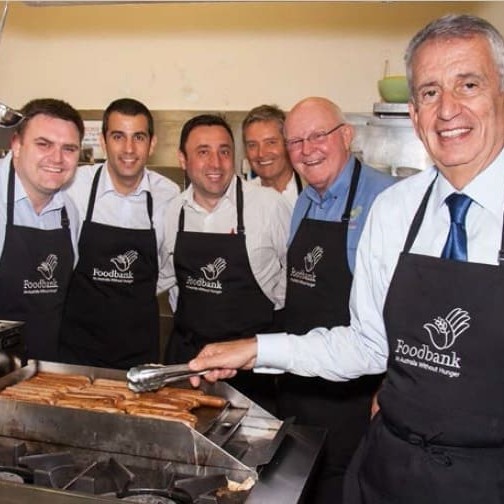Valuable protein is now more readily available to needy charities around the country thanks to the Australian meat industry.
In a chain of collaboration which stretches right back to the farm, donated livestock are being turned into sausages as part of the Foodbank Meat Program.
 Foodbank Australia is a national organisation established 21 years ago, dedicated to sourcing and distributing donated foodstuffs among hundreds of charities that help the needy.
Foodbank Australia is a national organisation established 21 years ago, dedicated to sourcing and distributing donated foodstuffs among hundreds of charities that help the needy.
Foodbank doesn’t cook or prepare meals itself, but acts as the charity sector’s ‘pantry’, gathering and distributing raw ingredients from farmers, food manufacturers and retailers to up to 2600 registered charity organisations across Australia.
Currently there are some two million Australians who are ‘food-insecure’, frequently going without meals. Last year Foodbank was responsible for generating sufficient food ingredients to provide 32 million meals.
That assistance might come in the form of ingredients supplied to charities putting breakfast in front of a child whose home-life might mean they otherwise would go to school hungry, through to providing meals in refuges for battered wives, or simply helping-out those who are struggling financially, or on the margins of society.
A special lunch was provided at the Salvation Army’s William Booth House in Sydney’s Surry Hills recently to celebrate the early success of the meat program.
Deliveries have commenced of 5000 kilograms of sausages to Foodbank warehouses every fortnight.
This is thanks to initial cattle donations by live export companies Wellard and Austrex which have been matched by processor, JBS Australia. The manufacture of the sausages is being donated by Primo Smallgoods with the support of its suppliers such as Devro, which has donated a year’s supply of sausage casings.
Other contributors are Snopack, Cryovac, Labelmakers and Visy, while Scott’s Refrigerated Transport is delivering the sausages around the country. Additional funds are being provided by the Department of Social Services.
JBS Australia has committed to donating a regular supply of meat in the short-term to get the program going, but the ultimate aim is to have sufficient cattle donated from farmers to provide ten times the current volumes to be turned into sausages and hamburger patties.
The meat program is the latest in a number of Foodbank initiatives to reach back along the food supply chain to source the fresh foods needed by hard-pressed charities trying to provide nutritious meals. Foodbank has now established programs that tap into the willingness of fruit and vegetable, dairy, grain and egg producers to help as much as they can.
Speaking at the recent lunch at William Booth House, Foodbank Australia chief executive John Webster said having a significant and sustainable meat program had long been a goal of the organisation.
“We’re extremely grateful to Primo Smallgoods, JBS Australia and the other partners who have come together to kick this off,” he said.
“Having sausages for 75,000 meals a month is an excellent start, but we know that the food gap is still great, so we’re hopeful the livestock donations will be forthcoming to ramp up the supply as fast as we can.”
“A full stomach is the first step towards helping someone,” William Booth House program manager John Wilson said. “Being able to obtain essential staples like meat for our meals from Foodbank means we can put our stretched resources into other programs to help people take the next steps.”
Primo Group chief executive Paul Lederer said working with Foodbank provided his company with the opportunity to tap into the passion that underpinned his organisation and apply it to a good cause.
“We feel a real affinity with the Foodbank ethos of doing what it takes to make a difference so we are proud to help make this program possible,” Mr Lederer said.
There have been some important developments in the supply side of Foodbank’s meat supply project in recent weeks. Beef Central will file an article when the details are finalised.
In the interim, cattle donation information can be obtained from Foodbank’s John Webster on (0408) 680 788 or email: johnw@foodbank.com.au
- Click here to read Beef Central’s earlier report on the launch of the Foodbank meat program.
- Beef Central encourages readers to share this opportunity with your friends and colleagues around the industry. Look for the ‘share’ icon among the five small icons top right of this page.
